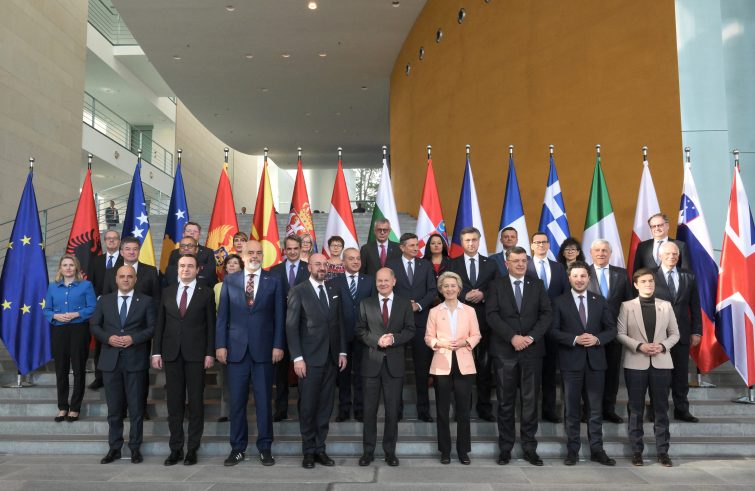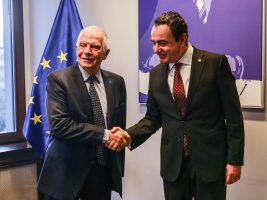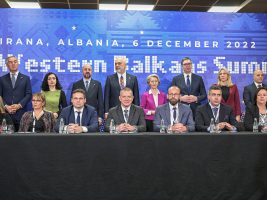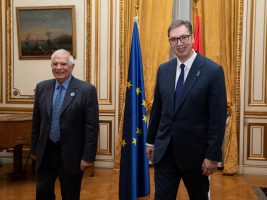
Ending the decades-long feud between Kosovo and Serbia and reaching an agreement to kick-start a European perspective for the two Balkan countries, which had been mutually hostile for a long time. Envoys from the United States and the European Union, along with French, German and Italian delegations, have been attempting to persuade national authorities in Pristina and Belgrade to resume talks over the past two months. Belgrade has consistently refused to recognise Kosovo as an independent state since the former province of Serbia proclaimed its independence (Feb. 17, 2008), claiming its territory to be its own and thwarting Pristina’s accession to all international organizations – notably the UN. Russia has been Serbia’s major ally in this process. But now times have changed and there is tremendous international pressure.
 EU High Representative for Foreign Policy Josep Borrell hosted a crucial meeting today on Kosovo-Serbia relations, attended by Serbian President Alexander Vucic and Kosovo Prime Minister Alexander Kurti. “Both parties will have to accept compromise solutions.” A compromise solution is inevitable; a long time has passed since the 2011 resumption of dialogue under the auspices of the EU, with frequent tense moments, and the international community cannot afford another conflict in Europe after Ukraine,” political analyst and Balkan expert Nikolay Krastev told SIR. Now the two leaders – Kosovo Prime Minister Albin Kurti and Serbian President Alexander Vucic – face the daunting challenge of reaching an agreement. According to Kurti, interviewed by AFP, the deadline set by the Western partners for reaching an agreement is the end of March.
EU High Representative for Foreign Policy Josep Borrell hosted a crucial meeting today on Kosovo-Serbia relations, attended by Serbian President Alexander Vucic and Kosovo Prime Minister Alexander Kurti. “Both parties will have to accept compromise solutions.” A compromise solution is inevitable; a long time has passed since the 2011 resumption of dialogue under the auspices of the EU, with frequent tense moments, and the international community cannot afford another conflict in Europe after Ukraine,” political analyst and Balkan expert Nikolay Krastev told SIR. Now the two leaders – Kosovo Prime Minister Albin Kurti and Serbian President Alexander Vucic – face the daunting challenge of reaching an agreement. According to Kurti, interviewed by AFP, the deadline set by the Western partners for reaching an agreement is the end of March.
Non-recognition. Kosovo is not recognized by as many as five EU member countries: Spain, Greece, Romania, Slovakia and Cyprus, all of which have large minority groups on their national territories. “The proposal backed by Germany and France however, enjoys the support of all 27 member countries, and in my view Greece is likely to grant recognition once the proposal is accepted by Pristina and Belgrade,” notes Krastev.
The French-German proposal. The nine-point plan centers on mutual respect for the two countries’ jurisdiction and territorial integrity. In particular,
the two States are encouraged to develop “good neighborly relations based on equal rights”; to “resolve disputes by peaceful means;” and to “establish permanent diplomatic missions within their respective governments’ seats.”
Most importantly, “neither party may represent the other in the international arena,” which could pave the way for Pristina to join the United Nations and the Council of Europe. In return for these concessions, a fast track in the EU integration process should be opened for Serbia, whereas Pristina will have to consent to the creation of an Association of Serb-majority municipalities in Kosovo.
- Borrell (Ue) e Kurti (Foto CE)
- (Foto Commissione Ue)
- Borrell (Ue) e Vucic (Foto CE)
The municipalities issue. It is a key issue in the agreement, at the heart of a heated debate over what it is meant to represent. In broad terms, the Association of Municipalities is supposed to provide a framework for Serb-majority municipalities for coordination in the areas of education, health, and regional economic development.
For Krastev, “Pristina’s concerns regard the creation of an entity resembling the Serb Republic in Bosnia and Herzegovina, a Serb enclave that could potentially destabilize the central government.”
Then again, the agreement is equally challenging for Serbian President Alexander Vucic, accused of treason by nationalist members of parliament. Protesters took to the streets in Belgrade against the Western partners’ ultimatum.
Belgrade risks being isolated. “President Vucic is well aware of the risks faced by Belgrade, namely, the disruption of the EU accession process; the withdrawal of Western investors, along with Serbia’s political isolation,” the Balkan expert analyst explained. At present, EU Countries account for 63 percent of foreign direct investment, in which case the Serbs would have to give up their standard of living.
The time to act is now. “The international community cannot afford instability in the Balkans because Russia would benefit from any imbalance in the area,” cautioned Krastev. In his view, “after the invasion of Ukraine, Western powers are unwilling to risk other hotbeds of tension.” This also explains Europe’s eagerness to achieve a comprehensive normalization of relations in the region.












